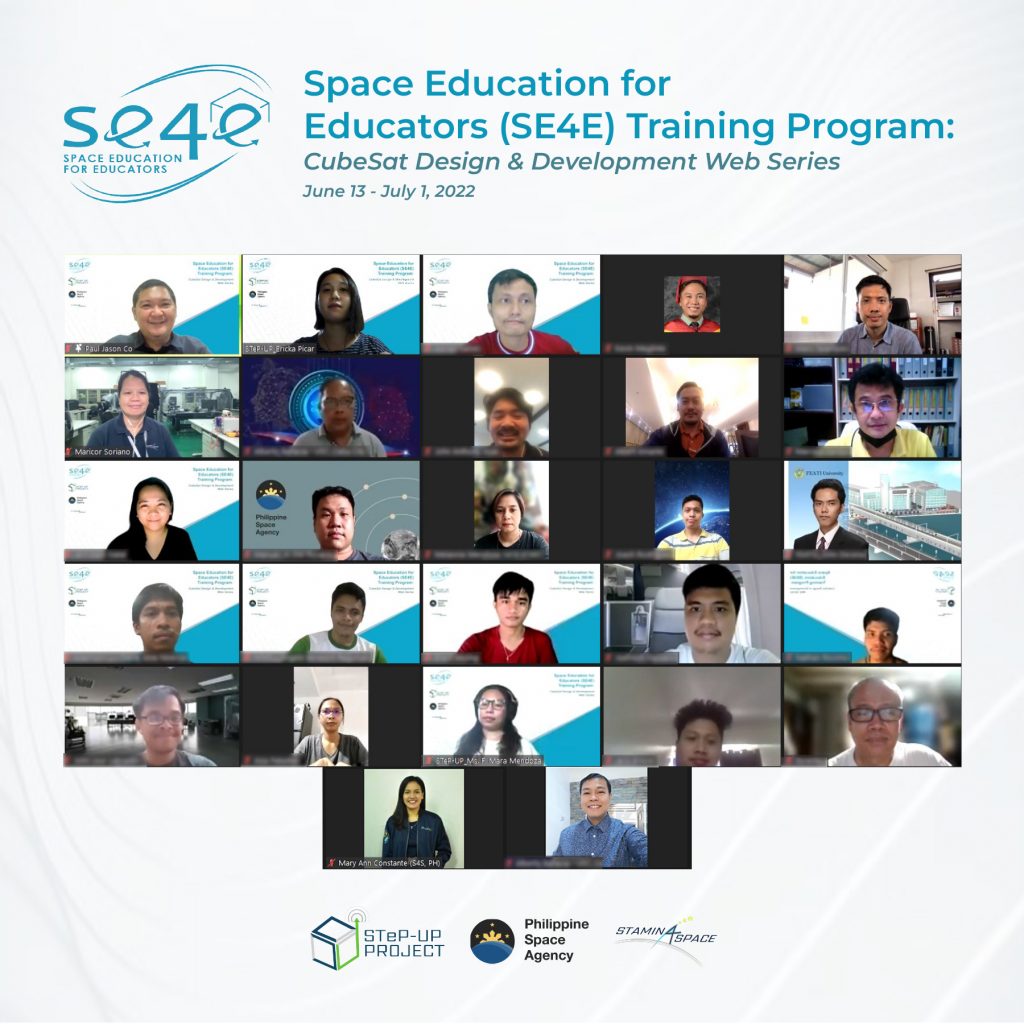Posted by STAMINA4Space Program and Philippine Space Agency
To foster an exchange of know-how and experiences on nanosatellite development, 12 universities from all over the country convened for the recently concluded SE4E: Space Education for Educators – CubeSat Design & Development Web Series held from 13 June to 01 July 2022.
Participating universities include: Batangas State University, University of Southern Mindanao, Mindanao State University-Iligan Institute of Technology, Adamson University, Mariano Marcos State University, University of Perpetual Help System DALTA, University of San Carlos, FEATI University, Cebu Technological University – Main Campus, Institute of Electronics Engineers of the Philippines, De La Salle University, and Holy Angel University.
The SE4E Web Series is an initiative of the Space Science and Technology Proliferation through University Partnerships (STeP-UP) Project of the Space Technology and Applications Mastery, Innovation and Advancement Program, or STAMINA4Space – a program co-implemented by the University of the Philippines and the Department of Science and Technology (DOST). SE4E is co-organized with the Philippine Space Agency (PhilSA).
The web series cascaded know-how on nanosatellite development to University Space Engineering Consortium (UNISEC) Philippines member universities, trained their researchers and faculty on space education, and provided an overview of the preliminary steps in satellite development. During the series of online lectures, the participants were encouraged to get started on satellite research and development through discussions, hands-on exercises, and workshop activities.
The first part of the web series was held from 13 to 21 June 2022 where lecturers from PhilSA presented an introduction to space systems engineering and CubeSat subsystems. Prof. Paul Jason Co, STeP-UP project leader and UNISEC Philippines point of contact, opened the lecture series, expressing his hope that through the web series, “a more complete picture of what it takes to plan, develop, and eventually operate these nanosatellites, which are the perfect platform for educational purposes as well as having large potential for future operational missions,” could be obtained.


PhilSA Space Technology Missions and Systems Bureau (STMSB) Director Marc Caesar R. Talampas welcomed the UNISEC universities, underscoring the need to work closely with the academe: “We’re looking at industry, academe, and government, and PhilSA is just the government leg of that tripod, we also need to strengthen the academe. And by partnering together with UNICSEC PH, we have these very good engineering and science universities that can take on the next step. And hopefully through this workshop we are able to impart some of our knowledge, but beyond that we also wish to learn from the member universities and learn the needs in terms of tertiary education with respect to space science and technology.”
The second part of the SE4E series, presented by STeP-UP researchers and engineers, held from 22 June to 01 July 2022, focused on discussions on satellite operations and CubeSat development.

During the closing program on 01 July 2022, PhilSA presented its initiatives for Philippine universities. Among these are the ECRADLE project, which aims to promote the expansion of nanosatellite R&D activities in the academe; and the “Advancing Core Competencies and Expertise in Space Studies Nanosat Project” (ACCESS Nanosat), which provides an opportunity for Filipinos to pursue a master’s degree with specialized courses in space systems engineering and satellite engineering.
Dean Lorena Ilagan from University of Perpetual Help System Dalta discussed ASEANSAT-1, a collaborative project between Malaysia and the Philippines. Batangas State University (BatStateU) President Dr. Tirso A. Ronquillo, talked about BatStateU as a National Engineering University. STAMINA4Space Program Leader Dr. Maricor Soriano also shared her experience on having a space program in a university setting.
A forum between UNISEC-Philippines and PhilSA on possible areas for collaboration concluded the program. Among the topics discussed were PhilSA’s space roadmap, funding support for a space program, and engaging students on space science and technology applications, R&D infrastructures and space education.
The SE4E Web Series aims to enrich the space science and technology community in the country by creating avenues for collaboration to strengthen the network of people involved in the space industry. PhilSA and the STAMINA4Space Program will continue to work together to bring space technology closer to the Filipino people.
For more information on SE4E, you may send an email to step-up@eee.upd.edu.ph, copy furnished to stmsb@philsa.gov.ph.

